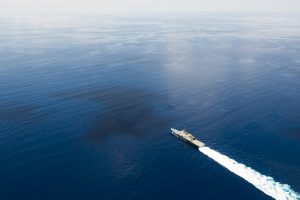In September, Chinese Vice Admiral Yuan Yubai, commander of the People’s Liberation Army Navy’s (PLAN) North Sea Fleet, insisted that the South China Sea belongs to China.
“The South China Sea, as the name indicates, is a sea area that belongs to China. And the sea from the Han dynasty a long time ago where the Chinese people have been working and producing from the sea,” he said through an interpreter, at a conference in London (See: “South China Sea Belongs to China”).
The United States Navy’s new chief of naval operations (CNO) Admiral John Richardson, however, is prepared to challenge this assertion, according to an interview with Defense News.
“What is coming into clear focus is that the defendant of the guarantor of prosperity and access is the system of rules and norms that we all abide by,” the admiral noted. “It’s interesting that some of the folks that are making contrary claims now … are the very nations who prosper the most under the current system of international rules and norms.”
The admiral was adamant that the South China Sea should remain open free and open waters:
You talk about coalition approaches, national approaches. I would advocate for a system that is inclusive, that levels the playing field as much as possible. That doesn’t talk in terms of my sea or your sea. That is everybody’s sea. You know 30 percent of the world’s trade goes through the South China Sea. Nobody owns that. It’s open. It’s international waters.
The U.S. Navy has been ready for some time to increase its freedom of navigation (FON) activities in the South China, something that has drawn criticism not only from China but also from The White House. Indeed, as a recent Diplomat contributor has argued, “none of its [China’s] current actions justify deliberate provocations by the United States,” such as naval patrols close to Chinese-held artificial islands (See: “Why South China Sea FON Operations Don’t Make Sense”).
Admiral Richardson, however, insists that the U.S. Navy is just following international norms and rules. He also emphasizes that there is little disagreement on the right South China Sea policies within the U.S.government:
[I]n terms of reinforcing the United States — as a global nation and our Navy as a global Navy able and willing to transit and pass through international waters — that’s a commitment we stand pretty firmly by. From the president on down, we iterate that position pretty clearly. Using the system of international norms and rules, none of this should be interpreted as provocative or responsive, this is just business as usual in the international system.
Writing for The Diplomat, Sam Bateman, points out that at “the heart of the U.S. protests are peculiarly American concerns about FON that relatively few regional countries share. In particular, these include the freedoms to conduct so-called ‘military surveys’ in the exclusive economic zone (EEZ) of another country. Another is the right of a warship to “transit a territorial sea without giving prior notification to the coastal state.”
In the interview with Defense News, Richardson refused to reveal the date when the destroyer USS Lassen would make such a transit. Officially, the United States continues not to take any sides in the ongoing territorial disputes in the South China Sea.

































